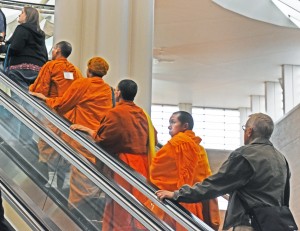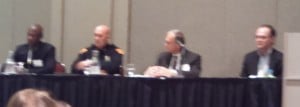All right, I admit it. I am off on a bit of a rant this week. At the moment I am feeling more than a bit frustrated. Many of us are active in community interfaith work because we sincerely believe that it is important that we open honest discussions with people of other spiritual practices because understanding and openness can and will lead to better communities. Since moving here to Huntsville, my husband and I have been active with both the Interfaith Mission Service and more recently with the monthly Diversity Dinners. Every month in the Interfaith Mission Service we get together over a meal, listen to a speaker talk about issues that affect our community, and then go home feeling warm and fuzzy about how we are so tolerant of each other’s beliefs.
Lately , however, I’ve been noticing a disturbing trend. Many, if not most, of the actual community programs sponsored by the IMS are strongly Abrahamic in nature. Programs tend to be held in churches. Even the annual Diversity Dinner sponsored by the IMS was held in a Christian church. One of their biggest programs is on interfaith dialogue between members of the Abrahamic faiths. I know that they mean well, but for those who are outside of those religions there is a subtle feeling of exclusion. So much so that I’ve noticed that our melting pot of a group is losing more and more of those from non-Abrahamic beliefs.
One month we had a guest attend our monthly dinner. And part way through the presentation he stood up and began a lengthy harangue on how anyone who was not specifically Christian was going to Hell. None of the program coordinators made any effort to stop him. I know that my husband and I and the two Muslim women with whom we were sitting were very uncomfortable. But when we tried to voice our feelings later in private to the program coordinators the general response was that they had no way to make him stop. I pointed out that failure to act could come across to some of us as condoning it, which really shocked them.
I’m certainly not saying that there was any direct lack of welcome to those of other faiths. I have always felt welcomed by both groups and I have had some very astute questions asked about my own faith. That being said, I have found it hard to become totally involved in some work because of the aforesaid feeling of being excluded, no matter how subtle and even unmeant that exclusion might be.
But in fairness to both sides, I must point out that our local Pagan community has no interest whatsoever in engaging in any sort of interfaith dialogue with those not of a Pagan persuasion. In fact when I first began working as a chaplain at our local hospital the most resistance I met was from our local Pagans who were appalled that I would consider acting as a chaplain, especially as a chaplain working with Christians. Heck, the local Pagans don’t even dialogue with each other.
Perhaps my problem is that I am expecting too much too soon. Maybe I should simply be grateful that we have a dialogue of any sort going on, that we do have an attempt at an interfaith dialogue no matter how flawed it might be. We did make some strides in the past month. I was invited to make a presentation on the beliefs and practices of Wicca at the monthly Diversity Dinner. And in the same week, under the sponsorship of the IMS, my husband offered the opening invocation for the City Council meeting. While these seem on the surface to be small tokens with a limited audience, they are actually pretty big steps here in the South. And the IMS has asked us to help re-write their meeting rules so that they are friendlier to non-traditional spiritual paths. So in this they listened to our concerns. It is moments of light like this when I find myself renewing my dedication to the interfaith process.
I truly believe, as I’ve said before, that interfaith dialogue and the acceptance of differences in religious belief are absolutely necessary if we are to have peace in our communities and in the world as well. Maybe it won’t come fast. Even within the interfaith community there remains lack of comprehension of how choices may lead to exclusion rather than inclusion of others. And if we are not sensitive to such nuances then we are kidding ourselves…we aren’t truly interfaith at all. We’re just engaging in mutual back-slapping because thinking we’re so great gives us a warm fuzzy feeling.
All of us who engage in interfaith work of any kind, from those of us who are actively engaged in community work to the individual who is willing to chat with another individual about their beliefs needs to periodically reassess how our actions might come across to others who do not hold the same beliefs as ourselves. Sometimes what we think we are saying and doing doesn’t come across in the way that we want it to.
















